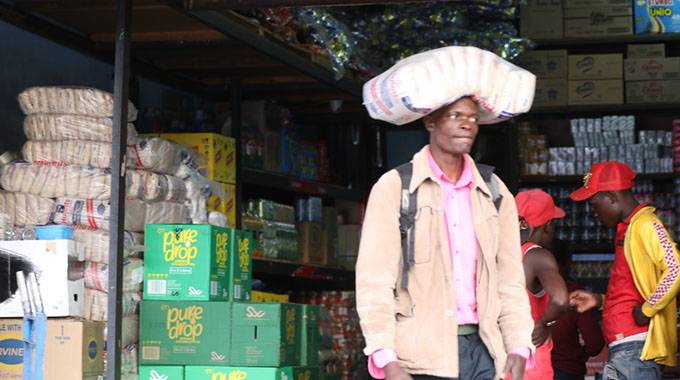‘Foreigners fuel smuggling’

Golden Sibanda Senior Reporter
FOREIGNERS who operate small unregistered shops in downtown areas of major cities in Zimbabwe, are reportedly perpetrating rampant smuggling of basic goods into neighbouring countries at a time Zimbabwe is experiencing acute shortage of the same, the Confederation of Zimbabwe Retailers (CZR) has claimed.
CZR says the issue has been reported to Government through the Ministry of Industry and Commerce for appropriate interventions.
The goods are reportedly smuggled out to countries such as Angola, Democratic Republic of Congo (DRC), Mozambique and Zambia.
CZR president Denford Mutashu, said his organisation, a lobby group for retailers, had gathered that foreigners — especially those operating tuck shops in downtown areas of major cities who have links with local suppliers — were behind some of the rampant smuggling of basic goods into neighbouring countries.
“We received information to that effect; there have been complaints about that. They (foreigners) may use Rapid Transfer Gross Settlement (RTGS) to buy from the supplier but when they sell, they sell in US dollars and what they get they come back and sell on the black market and they get high premiums,” Mr Mutashu said.
The US dollar exchange rate (against bond note or RTGS) is about 200 percent on the black market, meaning, foreigners using the hard currency need to spend only a fraction of that currency to buy Zimbabwean commodities on official markets where the exchange rate to bond note or RTGS is 1 to1.
Shortages of basic goods have given rise to speculation that producers who get foreign currency support from the central bank have not been honest in their dealings by allegedly holding on to large stocks of basic products in their warehouse for speculative trading.
Amid the supply and production challenges caused by shortage of foreign currency in the country, consumers have been the biggest victims in that either they have to do without most of the basic goods they require or when available they pay steep prices.
However, business is reportedly brisk in the trading of smuggled basic commodities on the informal markets of Zimbabwe’s neighbouring countries or in the region at a time the Southern African country is battling acute shortages on the back of supply/production bottlenecks.
The distortions on the currency front have caused basic goods produced in Zimbabwe to become artificially cheaper than products from the region, prompting unscrupulous individuals to hoard the products for resell in neighbouring countries, according to Pure Oil Industries chief executive Rodreck Musiyiwa.
The country uses a basket of foreign currencies, which is in short supply, but has maintained an official exchange rate of 1 to 1, including for pricing, between the main transacting currency
(US dollar) and bond note or its electronic equivalent.

An unidentified man carries a 20kg case of sugar he bought from a tuckshop in downtown Harare. Tuckshop owners have been accused of facilitating smuggling of basic commodities to neighbouring countries. — (Picture by Justin Mutenda)
“Our products have also become artificially cheap because of the currency issue and are being smuggled into neighbouring countries where they are sold in US dollars,” Mr Musiyiwa, whose company produces Zimgold cooking oil, told Industry and Commerce Minister Mangaliso Ndlovu during a tour of his firm recently.
Efforts to get comment from United Refineries Limited chief executive Busisa Moyo, who is on record saying some of their products were being sold in regional countries they have never exported to, were unsuccessful yesterday.
Denying any wrong doing by manufacturers Mr Moyo told the Sunday Mail Business: “However, there is a lot of rent-seeking behaviour on our cooking oil products by small retailers, hoarders, arbitrageurs and rent-seekers.”
This comes amid growing questions as to why manufacturers of basic commodities have failed to abet shortage despite assistance from Government to import key raw materials, resulting in Government passing legislation to allow the importation of most basic products by individuals and corporates with free funds.
The smuggling is an extension of illegal practices by small shops located in downtown areas of major cities such as Harare and Bulawayo where the traders are always fully stocked with goods their bigger and formal counterparts do not have.
Where they are found, the products are only sold in local cash money and foreign currency, raising questions as to how the traders always have access to large of volumes basics such as cooking oil, fruit juice, laundry bars, sugar and rice.
The issue of Zimbabwean products being taken advantage of is not limited to products such as cooking oil, sugar and soaps, but other key commodities such as fuel, which require foreign currency to bring into the market.
Foreign truckers are reportedly in the habit of exchanging US dollars meant for fuel on the parallel market and then fill up on their tanks at a fraction of foreign currency in hand by paying in the local currency, RTGS, swipe or Ecocash.










Comments